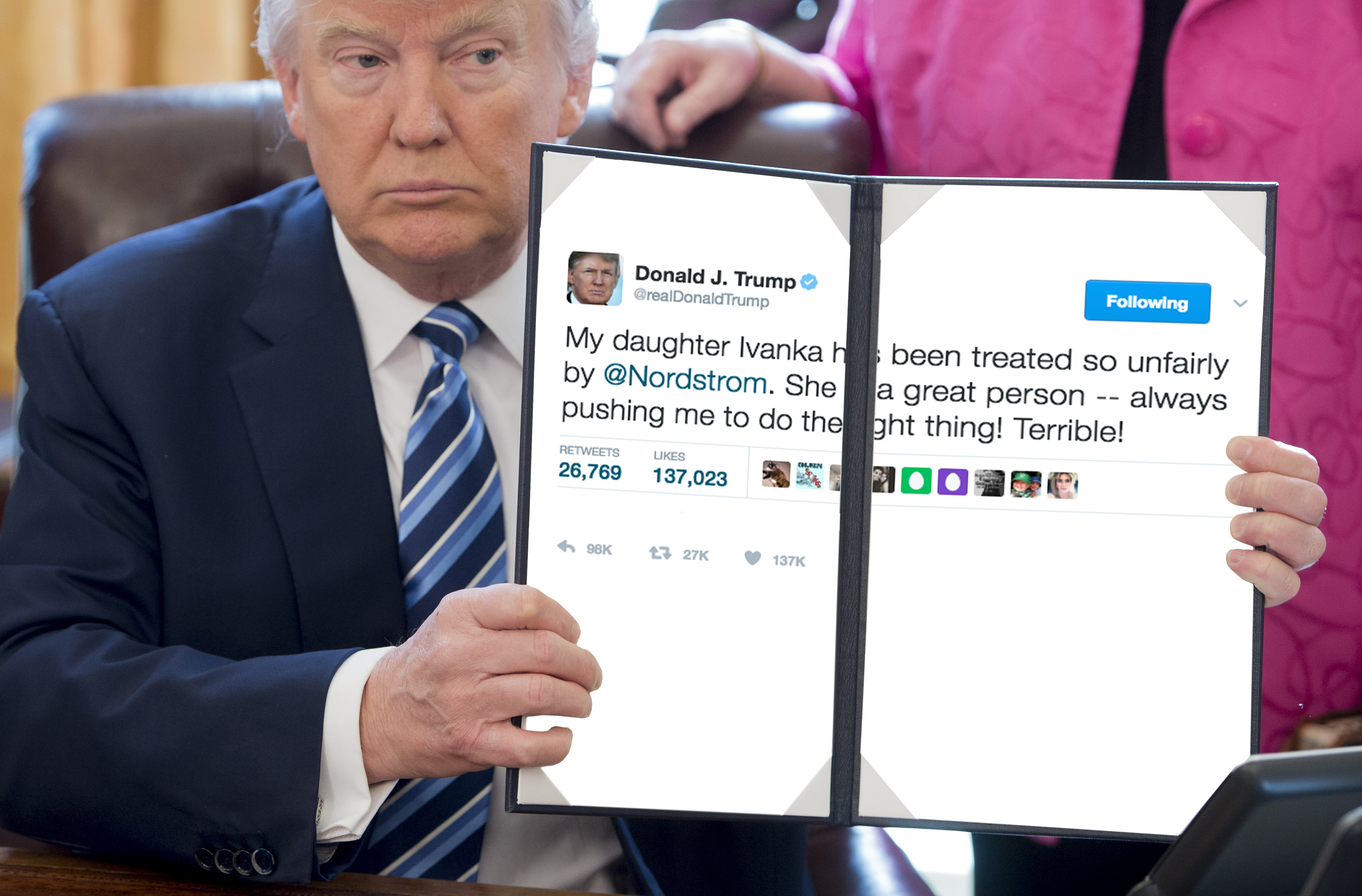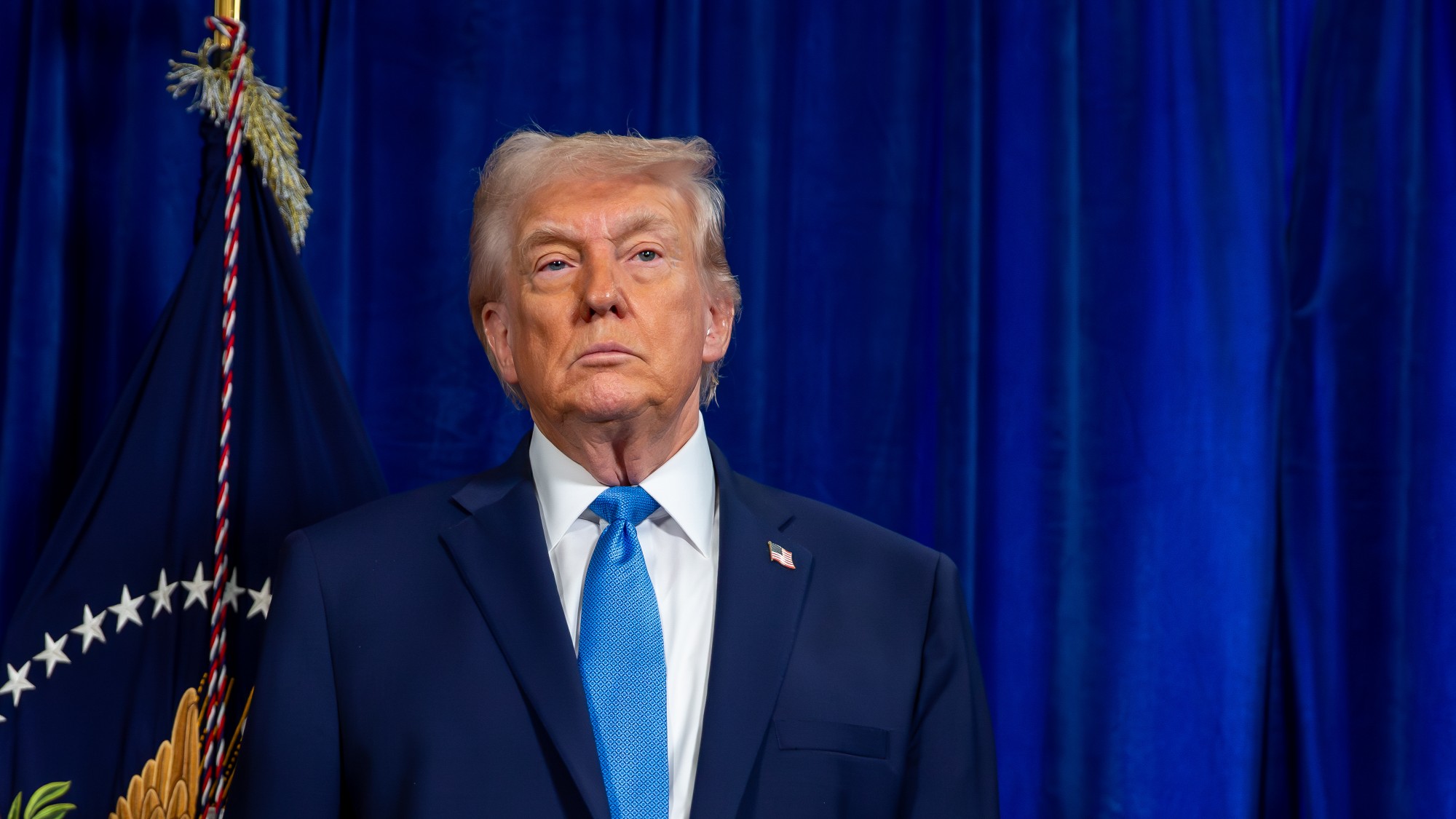Democrats: Don't waste your time hounding President Trump for corruption
Experts on authoritarians repeat the same lesson: Tyrants are brought down by their ineffective policies, not their self-dealing


A free daily email with the biggest news stories of the day – and the best features from TheWeek.com
You are now subscribed
Your newsletter sign-up was successful
We're only a few weeks into the presidency of Donald Trump, and already the self-dealing is piling up.
Trump hasn't divested from any of his businesses, and he's poised to use the White House's regulatory powers and political clout to juice his own profits. He's already stumping for his hotels and golf courses during his diplomatic duties. He's fighting with Nordstrom for dropping his daughter's product line. Most recently, Trump's senior adviser, Kellyanne Conway, told Fox News viewers to buy Ivanka Trump's brand during an interview from the White House — a clear violation of executive branch ethics rules.
Democratic Party officials and Hillary Clinton's former team must be tearing out their hair in disbelief.
The Week
Escape your echo chamber. Get the facts behind the news, plus analysis from multiple perspectives.

Sign up for The Week's Free Newsletters
From our morning news briefing to a weekly Good News Newsletter, get the best of The Week delivered directly to your inbox.
From our morning news briefing to a weekly Good News Newsletter, get the best of The Week delivered directly to your inbox.
For months during the campaign, Clinton was dogged by accusations of corruption, from her emails to her speaking fees to alleged donate-for-influence arrangements at the Clinton Foundation. Yet here's Trump and his underlings engaging in far more brazen self-dealing with apparently no consequences. Politically, it all just rolls off them.
Why?
In the case of Republican politicians who refuse to hold Trump accountable, the answer is obviously raw opportunism and hypocrisy.
But in terms of Trump's standing with voters, I suspect something deeper is going on. When Trump's opponents point out his corruption, expecting it to hurt him politically, they make a basic error. They assume Trump's support, like Clinton's, derives from voters' desire for responsible management by a sober member of the American elite. Indeed, Clinton's campaign strategy was built around this theory: It presented her as the very best that American meritocracy has to offer — exceptionally well-educated, unfailingly politically correct, earnest, intelligent, and morally upstanding. And it presented Trump as an erratic and intemperate vulgarian, a demagogic racist, and a crass misogynist.
A free daily email with the biggest news stories of the day – and the best features from TheWeek.com
Except Trump sold himself by effectively agreeing with Clinton on this. He intuited that vast swaths of American voters have completely lost faith in the competence and good intentions of America's meritocratic elite. Voters have lived under a gargantuan economic collapse and disastrous wars. They've watched their jobs disappear, their wages stagnate, and their children's futures disappear, all while the elites make out like bandits.
So Trump pitched himself as the antithesis to Clinton's crowd.
This isn't simply a matter of Trump's policy positions on immigration or free trade, which reject the elite consensus of the center-left and center-right. It's a matter of his brash and bullying personality, his contempt for educated expertise, his relentless dissembling, and his complete disinterest in abiding by moral norms against racism and sexism. The whole package amounts to one giant middle-finger shoved in the face of the tribe Clinton represents.
Trump entered office with the lowest approval rating of any incoming president in at least 40 years. Large numbers of his own voters don't like him. The point of electing Trump was to let the bull loose in the China shop. While corruption isn't part of that point, it doesn't really contradict it either. Not the way it contradicted the point of electing Clinton.
I bet this is also why the corruption charges stuck to Clinton so relentlessly. They directly undermined her campaign's own narrative about herself. She's supposed to be the consummate public servant, but really she's just out for herself. And regardless of how fair the specific charges were, the overall story was plausible to voters precisely because their prospects really have rotted in the last few decades under the elites' watch.
This also hints at how Trump can be brought down politically.
The president may be a nihilist, but his voters aren't: Many of them feel optimistic about the future. And again, you can see why: After decades of disastrous rule, the elites have finally been booted from power. Someone has entered the White House who will finally improve the lives of the broad middle of American workers.
But Trump will inevitably fail to live up to these hopes. His promise to repeal ObamaCare is already turning into a debacle, complete with a ferocious backlash at GOP town halls. His reactionary Cabinet picks and hard-charging zeal for deportation are already sparking major protests. His economic agenda is virtually guaranteed to squash the already middling recovery. Other democracies like Italy have recently dealt with bellicose authoritarians like Trump, and observers repeat the same lesson: Don't get distracted by the corruption or the personality or the violations of norms. Concentrate on the results of their policies for the population as a whole.
Pointing out Trump's corruption in and of itself will never be more than symbolic. But once public dissatisfaction sets in, it could become a powerful symbol.
This all means the Democrats must change, too.
When he was first elected in 2008, Barack Obama had one of the most impressive grassroots organizations ever assembled. But then it was muzzled and placed under the umbrella of the Democratic National Committee (DNC), so the party's politicians wouldn't face inconvenient pressure and protests from their own side. Then the party treated Bernie Sanders' insurgent 2016 campaign as a left-wing version of the Trump phenomenon: unworthy rabble that had to be kept from power. The Democrats' governing philosophy seems to be that their voters should elect competent elites, then quiet down and be grateful for whatever half-measures those elites provide them.
Now Rep. Keith Ellison (D-Minn.) is running to chair the DNC. He seems to understand how this aristocratic, top-down thinking allowed on-the-ground organizing to whither and the party's power in local government to collapse. My colleague Ryan Cooper convincingly argues that Ellison's rival for the position, former Labor Secretary Tom Perez, is basically running for DNC chair to make sure the Democrats' strategy and institutional design remain under the control of the Obama-Clinton tribe. So the DNC race is shaping up to be the first real test of what the Democratic Party is learning in defeat.
If they insist on remaining elitist meritocrats, they will keep losing.
Jeff Spross was the economics and business correspondent at TheWeek.com. He was previously a reporter at ThinkProgress.
-
 American empire: a history of US imperial expansion
American empire: a history of US imperial expansionDonald Trump’s 21st century take on the Monroe Doctrine harks back to an earlier era of US interference in Latin America
-
 Elon Musk’s starry mega-merger
Elon Musk’s starry mega-mergerTalking Point SpaceX founder is promising investors a rocket trip to the future – and a sprawling conglomerate to boot
-
 5 superbly funny cartoons about the Superbowl
5 superbly funny cartoons about the SuperbowlCartoons Artists take on historical reenactment, biased bowls, and more
-
 The billionaires’ wealth tax: a catastrophe for California?
The billionaires’ wealth tax: a catastrophe for California?Talking Point Peter Thiel and Larry Page preparing to change state residency
-
 Bari Weiss’ ‘60 Minutes’ scandal is about more than one report
Bari Weiss’ ‘60 Minutes’ scandal is about more than one reportIN THE SPOTLIGHT By blocking an approved segment on a controversial prison holding US deportees in El Salvador, the editor-in-chief of CBS News has become the main story
-
 Has Zohran Mamdani shown the Democrats how to win again?
Has Zohran Mamdani shown the Democrats how to win again?Today’s Big Question New York City mayoral election touted as victory for left-wing populists but moderate centrist wins elsewhere present more complex path for Democratic Party
-
 Millions turn out for anti-Trump ‘No Kings’ rallies
Millions turn out for anti-Trump ‘No Kings’ ralliesSpeed Read An estimated 7 million people participated, 2 million more than at the first ‘No Kings’ protest in June
-
 Ghislaine Maxwell: angling for a Trump pardon
Ghislaine Maxwell: angling for a Trump pardonTalking Point Convicted sex trafficker's testimony could shed new light on president's links to Jeffrey Epstein
-
 The last words and final moments of 40 presidents
The last words and final moments of 40 presidentsThe Explainer Some are eloquent quotes worthy of the holders of the highest office in the nation, and others... aren't
-
 The JFK files: the truth at last?
The JFK files: the truth at last?In The Spotlight More than 64,000 previously classified documents relating the 1963 assassination of John F. Kennedy have been released by the Trump administration
-
 'Seriously, not literally': how should the world take Donald Trump?
'Seriously, not literally': how should the world take Donald Trump?Today's big question White House rhetoric and reality look likely to become increasingly blurred
